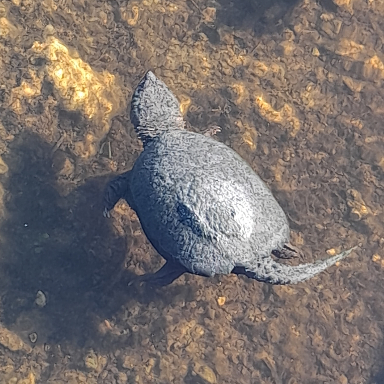“Tree” isn’t a biological definition. It’s a descriptive term for “a tall plant with at least one rigid central trunk.” Which means that anything that looks like a tree is probably a tree, regardless of species.
I am a tree
Ayy, welcome to the tree club!
shrieks TREE LAWWWWW
TREEEEEESSSS THEY ARE UUUUSSSSSS
We welcome you to tree-hood, my fellow arbor
Do you get pollinated by birds and bees?
That’s personal
There’s no such thing as a tree.
And as a QI fan, I feel compelled to add there’s no such thing as a fish
No such thing as a tree? So you mean all those binary trees I’ve been inverting have been a lie? My whole world is shattered.
Indeed, it simply is not a phylogenetic categorization but a physio-ecological one. Tree, like shrub, liana, herbaceous, woody/non-woody are all terms solely used to place plants into functional groups based on how they grow. None of these has to do with their taxonomy.
So the question is, what is a tree and is having secondary growth necessary to be one? Because monocots, like palms are, don’t have secondary growth, they use some workarounds. But why should that matter in the definition of a tree? I don’t know. So yeah, a coconut palm should be considered a tree. But it hasn’t got to do with phylogenetics (like explained in the article you linked).
Also, millennia ago there have been vast forests of lycopods!! Just imagine huge trees that are actually spikemosses. So why shouldn’t a palm not be a tree?
my definition of a tree is basically “a plant consisting of a single pillar-like robust trunk”.
most plants can be trees, especially ones that generally grow as bushes, if they are prodded into doing so by pruning and whatever other pressures, and there are some plants that seem to flip a coin to decide whether they grow into bushes or trees.
Of plants native to the Canary Islands, wood independently evolved at least 38 times!
You forgot about the myth of vegetables.
Except that yes there is. It’s just not a scientific term. Same with fish.
A local park ranger I know likes to remark that our state tree is a grass. (I’m in Florida.)
But I’d say that’s also inaccurate. IMO, grasses are in the family Poaceae, and palms are in the family Arecaceae. I guess one could remark that our state tree is a commelinid…but I don’t think tourists would get as much of a kick out of that.
Typical trees belong to a group of plants called dicots
Whaaaat? Swiftly ignoring all gymnosperms? The temperate zones are full of trees that aren’t dicots, or even angiosperms! Focusing on some biological traits that aren’t crucial to the definition of a tree sounds like the author already likes their neat categories and wants to retroactively justify them…
Halt! I’m here to check the expiry date of your facts!
Neat read, thanks
There’s no widely-accepted scientific definition of a tree.
##PeopleCorrectingPeopleIncorrectly
This is a reminder that there is no universally accepted botanical definition of tree. It is also a reminder that usage supersedes definition, so pointing out that coconut palm trees aren’t “trees” makes you both annoying and wrong.
The definition of tree exists within the context of all that came before it? 🌴
Only in the context of biology and evolution, which the right doesn’t understand.
Mmmmm, I’d say specialists would not use the broader definitions that are more colloquial in nature. Language depends on the user and their purpose/intent. Generally, trees are woody plants with secondary growth and they aren’t monocots. It’s not a hard boundary, but really depends on context.
https://scholar.google.com/scholar?hl=en&as_sdt=0%2C3&q=coconut+tree
Someone should tell the authors of these hundreds of papers then.
You do realize the qualifiers you edited in are exactly my point and directly contradict your post, right?
There’s no way you actually read that.
It’s literally a blog post of one person’s opinion which concludes without a definitive statement, that it’s not settled if they’re trees or not, and then links to a page “for further reading” that categorizes them under trees.
I did and I agree with the author. You do not have to agree with us. It’s a form vs function argument. There is not a “right absolute” answer, it’s about how you approach the question.
then we agree that it’s incorrect to definitively say that a “palm tree” is not a tree.
rigidly defending the boundaries of a biological category that’s not a monophylitic group is an exercise in futility. or maybe in linguistics, because if it’s not monophyletic it’s not “real” in an evolutionary sense and the question is in the cultural realm and somewhat subjective. It’s like the discussions about whether a certain food is a fruit/vegetable/etc.
I see it as a paradox. :) I don’t like calling them trees. I just call them palms.
Oak trees are more closely related to palm trees than they are to pine trees. It would be pretty arbitrary to exclude monocots but still include magnolids and gymnosperms.
Even from a purely structural perspective, they’re all tall and have wood and leaves. Palm trees and banana trees don’t have woody branches, but joshua trees do. I guess there’s a difference that no monocot tree has heartwood, but you’ll still need a chainsaw to saw through the trunk of a palm tree.
i like the chainsaw point actually. if i’ve gotta get rid of a palm tree, i’ll be calling a arborist, not a shrubber or a lawnmower.
Wait, what?
Palms, like corn, are really tall grass.
https://www.tampabay.com/archive/2011/11/06/yes-technically-palms-are-a-big-grass/
Conifers aren’t trees by this definition. It seems to completely ignore gymnosperms and even misclassified a couple as dicots like sequoias and junipers.
We need to stop looking for a scientifically coherent category for a tree and ,like fish, embrace the true, intuitive, childlike definition of it as just a form, a trunk with leaves at the top.
How many social credit points do I lose if I refer to bamboo products as “wood” outside of botany nerd circles?
I’d say about 69.
Nice.
If I remember correctly, wood consists mainly of cellulose, lignin, and hemi-cellulose. I don’t know about bamboo, but I guess it’s some kind of woody material.
It’s the lack of lignin (bamboo uses silica as a strengthener) that sets it apart.
But bamboo is a grass, anyways.
Never doubted bamboo not being a grass. But I didn’t know about the silica thing - that’s really cool!! Thank you for telling this!
It’s the lack of lignin (bamboo uses silica as a strengthener)
Oh I see
“Trees” have secondary growth while “palms” have primary growth. At least that is what I have been told in dendrology lectures.
not necessarily no
true enough, that doesn’t exclude them from being trees though.
From the coco palm family!
🎵 Ya ya ya ya ya 🎵
it looks like a tree and quacks like a tree though.
Ironically, in this case, that literally means it’s a tree
Trees are the plant version of crabs.
It’s probably going to be political since it’s wrong.
The coconut tree (Cocos nucifera) is a member of the palm tree family (Arecaceae) and the only living species of the genus Cocos. The term “coconut” (or the archaic “cocoanut”) can refer to the whole coconut palm, the seed, or the fruit, which botanically is a drupe, not a nut. They are ubiquitous in coastal tropical regions and are a cultural icon of the tropics.
I’m off to edit that wiki, the tree is a bit of a misnomer.
I see a fight coming your way in the talk section, lol. Good luck.
Nah, it’s correct. Just needs a clarifying sentence. They use the word tree but it’s not technically a tree, rather tree-like. The word tree is used for ease, colloquially. They grew like this as they are plants well suited for seaside wind and storms, hurricanes… Wetland plants. The grasses that didn’t give up. Tree definitions vary from form vs function, and form is used more colloquially.
Edit: Fixed yayayayyay I need more edits this month
No tree is a tree. “Tree” is not a clearly-defined taxonomical category. Anything that is tree-like gets grouped under the catgory “tree”.
I think it’s arguable that “tree” is just a term for a growth habit rather than anything really taxonomically meaningful.
agreed. my grandma used to have a big ol’ tree in her front yard, but it had to get cut down. it didn’t die though, and thanks to this unintentional coppicing, it is now an enormous bush. my grandma is very proud of her bush.
Yeah, good luck with that.
https://en.m.wikipedia.org/wiki/Tree
In wider definitions, the taller palms, tree ferns, bananas, and bamboos are also trees.
Okay, and raspberries aren’t technically berries at all, but aggregate fruits. In other words, so the fuck what? When you say ‘coconut tree’, everyone knows what plant you’re referring to.
You exist in the context of all in which you live and what came before you 🌴🥥🍹
birds are dinosaurs
Fuck it, birds are trees.
😔 now you’ve gone too far.

According to OP’s definition:
Woody ✅
Secondary growth (feathers) ✅
Not a monocot ✅
https://i.postimg.cc/wBYcTxn8/delayed-agreement.png
you win 10 internet(s)
Birds are not real https://www.youtube.com/watch?v=3VEkzweBJPM
Time to post one of my favorite songs:
(“Da Coconut Nut”, by Ryan Cayabyab. This version is probably the one performed by his group, Smokey Mountain.)
This song reminds us that the coconut is not a nut; it is the fruit of the cocopalm.
Da palm grows da coconut and turns da election around
I have literature right here that says otherwise.
Ahem…
“A told B, and B told C, I’ll beat you to the top of the coconut tree.”


















